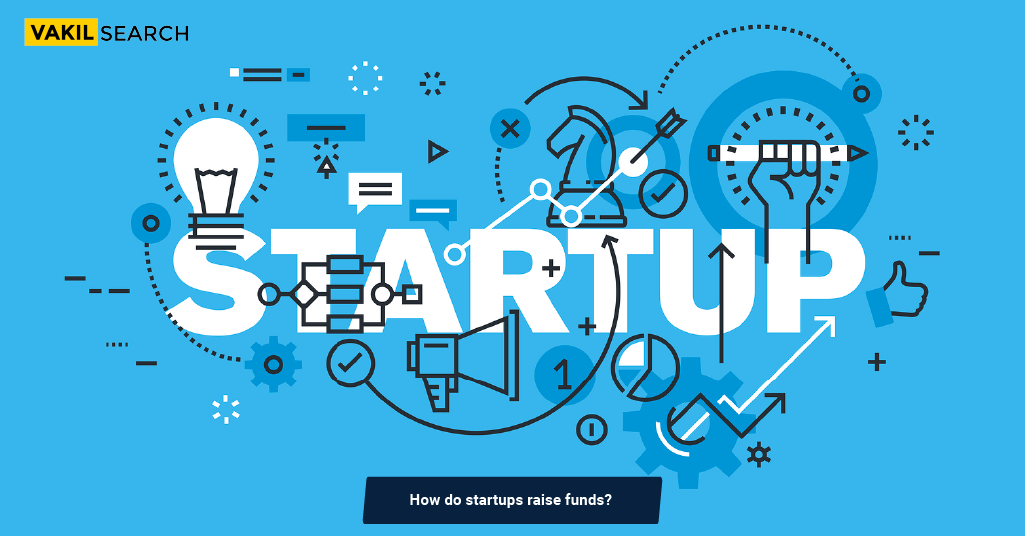Learn how Indian startups raise funds: bootstrapping, VC, angel investors, crowdfunding, government grants, corporate partnerships, with Vakilsearch's guidance.
Introduction
Startups are the lifeblood of innovation and entrepreneurship, driving economic growth and pushing the boundaries of what’s possible. However, to turn their visionary ideas into reality, startups often need the significant capital injection. In this article, we will explore the various avenues startups typically use to raise funds, delving into venture capitalists, angel investors, bootstrapping, crowdfunding, and more. To provide practical insights, we will incorporate testimonials and brief case studies of successful Indian startups and how they managed their funding.
Bootstrapping: The Self-Sustaining Approach
Bootstrapping is the practice of self-funding a startup, which means relying on personal savings or revenue generated by the business to fuel its growth. This approach allows founders to maintain full control over their ventures and avoid external investors. While it can be challenging, bootstrapping has worked wonders for many startups.
Case Study 1: Zoho Corporation
One of India’s most successful bootstrapped startups is Zoho Corporation. Founded in 1996 by Sridhar Vembu, Zoho offers a suite of cloud-based software tools for businesses. Despite facing stiff competition from giants like Microsoft and Google, Zoho has thrived through its commitment to self-funding. Today, it serves millions of customers worldwide.
-
Testimonial:
Sridhar Vembu, Founder of Zoho Corporation, says, ‘Bootstrapping allowed us to stay true to our vision and control our destiny. We didn’t compromise on our values, and that’s what makes us unique in the industry.’
-
Venture Capitalists: Funding with a Strategic Partner
Venture capitalists (VCs) are professional investors who provide funding to startups in exchange for equity. Beyond the capital injection, they often bring valuable expertise, mentorship, and industry connections to the table. However, securing VC funding can be a rigorous process.
Case Study 2: Flipkart
Flipkart, one of India’s largest e-commerce companies, successfully raised funds from venture capitalists like Accel Partners, Tiger Global, and SoftBank. These investments played a pivotal role in the company’s rapid growth and market dominance. Flipkart was eventually acquired by Walmart for $16 billion in 2018.
-
Testimonial:
Sachin Bansal and Binny Bansal, Co-founders of Flipkart, shared their VC experience: ‘Working with venture capitalists was like having strategic partners who helped us scale our operations, expand our product range, and navigate challenges effectively.’
Angel Investors: Early-Stage Guardians
Angel investors are individuals who provide capital to startups in their early stages. They often bring not only funding but also industry expertise, mentorship, and valuable connections. Angel investors play a crucial role in helping startups bridge the initial funding gap.
Case Study 3: Ola Cabs
Ola Cabs, now known as Ola, revolutionised the Indian transportation industry. Bhavish Aggarwal and Ankit Bhati, the founders, secured funding from angel investors like Rehan Yar Khan and Anupam Mittal. This early-stage capital allowed Ola to compete aggressively against established players.
Testimonial:
Bhavish Aggarwal, Co-founder and CEO of Ola, said, ‘Angel investors not only provided us with the financial runway but also valuable guidance and introductions to industry leaders, which were instrumental in our growth.’
Crowdfunding: Harnessing the Power of the Crowd
Crowdfunding has gained popularity in recent years as a means for startups to raise funds. It involves gathering small amounts of money from a large number of people, typically through online platforms. Crowdfunding can take various forms, including reward-based, equity-based, and donation-based crowdfunding.
Case Study 4: Ketto
Ketto is India’s largest crowdfunding platform for social and creative causes. Founded by Varun Sheth and Kunal Kapoor, Ketto has helped thousands of startups, nonprofits, and individuals raise funds for their projects. Through the power of crowdfunding, Ketto has made a significant social impact.
Testimonial:
Kunal Kapoor, Co-founder of Ketto, shared his insights: ‘Crowdfunding democratises funding, allowing startups and causes of all sizes to access capital. It’s not just about the money; it’s about the community support that fuels your mission.’
Government Grants and Subsidies: Support for Innovation
Governments around the world, including India, offer various grants, subsidies, and incentives to promote innovation and entrepreneurship. These funds can be a lifeline for startups, especially those working on research-intensive or socially beneficial projects.
Case Study 5: Bharat Biotech
Bharat Biotech, a leading vaccine and biotechnology company in India, received significant support from government grants and subsidies. This funding played a crucial role in the development of COVAXIN, India’s first indigenous COVID-19 vaccine.
Testimonial:
Dr. Krishna Ella, Chairman and Managing Director of Bharat Biotech, emphasised the importance of government support: ‘Government grants helped us accelerate our research and development efforts, enabling us to bring a life-saving vaccine to market.’
Corporate Partnerships and Accelerators: Strategic Collaborations
Many established corporations run startup accelerators and incubators to identify and nurture innovative startups. These programs offer not only funding but also mentorship, workspace, and access to a network of industry experts and potential customers.
Case Study 6: Microsoft Accelerator
Microsoft Accelerator is a global program that supports startups through funding, technology resources, and mentorship. Several Indian startups, including Innovaccer and Practo, have benefited from Microsoft’s accelerator program.
Testimonial:
Rishi Bhargava, Co-founder of Innovaccer, shared his experience: ‘Microsoft’s accelerator program provided us with the guidance and resources we needed to scale our healthcare technology startup and make a global impact.’
Conclusion
Startups have various avenues to raise funds, each with its own advantages and challenges. Whether through bootstrapping, venture capitalists, angel investors, crowdfunding, government support, or corporate partnerships, the key is to align the chosen funding source with the startup’s goals and growth trajectory.
As demonstrated by the case studies and testimonials of successful Indian startups, the path to securing funding is not a one-size-fits-all approach. Instead, it requires a deep understanding of the startup’s unique needs, a clear vision, and the determination to see it through.
Additionally, service providers like Vakilsearch have played a significant role in simplifying the legal and regulatory aspects of fundraising for startups in India. Vakilsearch’s expertise in legal matters, including company registration, compliance, and documentation, has been instrumental in helping startups navigate the complexities of fundraising, ensuring they can focus on their core business activities.









